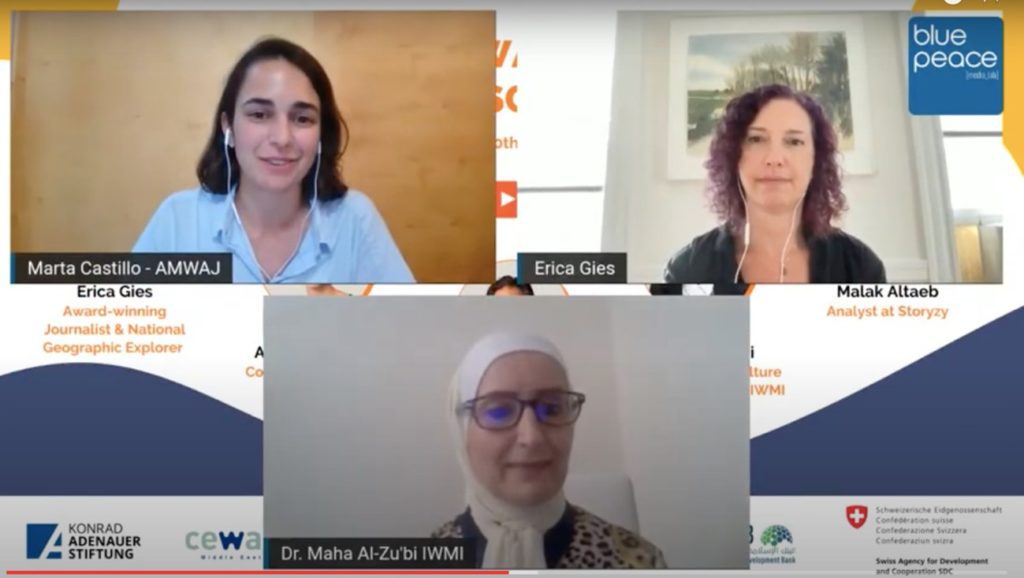Five representatives from different sectors within the water and media landscape came together in a session moderated by AMWAJ to discuss about constructive water journalism. The session kickstarted the ‘Solution-driven Water Journalism Workshop’ – a two-days workshop organized by the Regional Program Energy Security and Climate Change Middle East and North Africa (KAS – REMENA) and cewas’ Blue Peace Media Lab the 30th and 31st of August. The workshop was supported by Smart Water Magazine, AMWAJ and the Centre for Strategic and International Studies (CSIS).
The panel discussion delved into water innovation and the coverage that media platforms do of that topic. Under the tittle Moving beyond the problem, the panellist shed light into how to shift the media focus from water issues to water solutions and innovations.
The panel was composed by: Jon B. Alterman – Senior Vice-President and director of the Middle East Programme at CSIS –, Malak Altaeb – Analyst at Storyzy –, Erica Gies – award-winning independent journalist –, Maha Al-Zubi – Researcher on Agriculture and Water Solutions at IWMI –and Aline Bussmann – co-director at cewas–. For one hour, the speakers discussed and exposed their ideas on to the potential synergies for constructive water reporting.
How to communicate water innovation?
The session started with some comments regarding the definition of water innovation and what it implies from Aline Bussmann.
“Essentially there is no one definition or one set of criteria that defines water innovation but there is a framework, in which, we as cewas, see innovation happening and this means seeing that ideas are being transformed into practical reality and only then innovation can respond to the need of people and the environment”.
Aline Bussmann, co-director at cewas
Around that topic, Erica Gies also highlighted the importance to talk about nature-based solutions and to encourage people to think about nature as a partner when you are considering water solutions. As she underlined, a lot of our problem-solving tends to be really single focused and “when we have these single-minded solutions we tend to negatively impact the natural system which is very complex”.
Following the discussion on water innovation and the complexity around water issues, Maha Al-Zubi added:
“We have to admit that water is interlinked with other sectors – such as energy or health – and that’s why when we are talking about innovation related to the water sector, it should take into account the different scales. I mean that it should touch several levels and be more multidisciplinary.”
Maha Al-Zubi, Researcher on Agriculture and Water Solutions at IWMI

Then the conversation moved forward, focusing particularly on media and communication of water issues. Jon B. Alterman commented on the need to link water problems to things that people already know and care about.
The extent that you can write about how the readers individual actions can begin to change the world is a very powerful way to push aside the bad news and get people to accept a lot more of the innovative actions and the possibility that they can take actions that would change their circumstances.
Jon B. Alterman, Senior Vice-President and director of the Middle East Programme at CSIS
Erica Gies shared some insights from her professional experience as a journalist recommending ways to increase the public’s interest on water related stories.
A potential hook to get people interested in water issues is climate change. I think people is starting to understand the link between climate change and the increase in floods, droughts or sludges and journalists can explain that further.
Erica Gies, award-winning independent journalist
The discussion on solution-driven water journalism concluded with a final remark from the researcher Malak Altaeb.
Understanding the audience we are talking to is important. Also, raising awareness among journalist to not only focus on the challenges but to always ask how and what kind of solutions are available at the local level and how to bring out all different stakeholders into this problems or solution-driven water stories.
Malak Altaeb, analyst at Storyzy
The audience also had the opportunity to ask questions to the panellist that were addressed at the end of the session. The panel discussion set the ground for the further discussion on the topics touched that took place during the 2-days workshop.
The Solution-driven Water Journalism Workshop gave the opportunity to aspiring environmental journalists and entrepreneurs from the MENA region to work together with the support and guidance of senior journalists and water experts to identify fresh angles for telling a water story through a solutions-based approach. The journalists will have opportunity to submit their water piece to a writing competition where the pieces with the most potential will be selected for publishing.